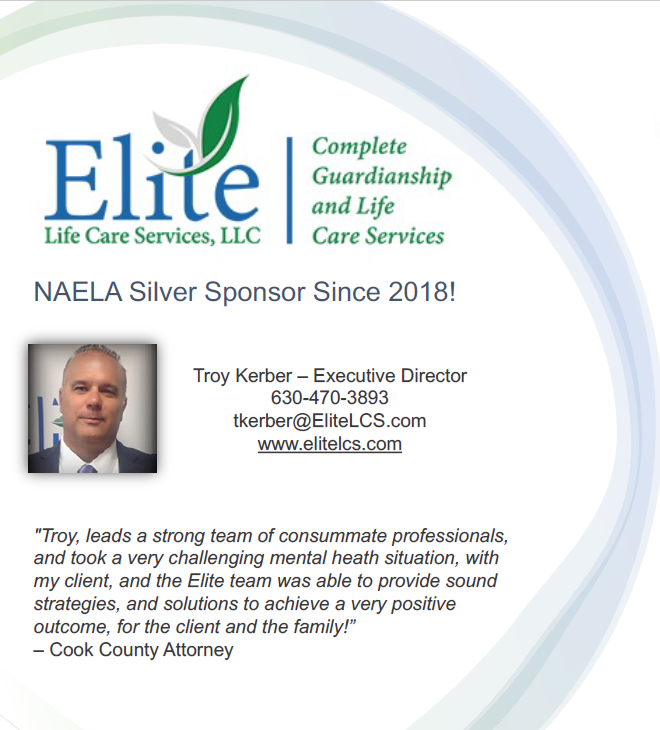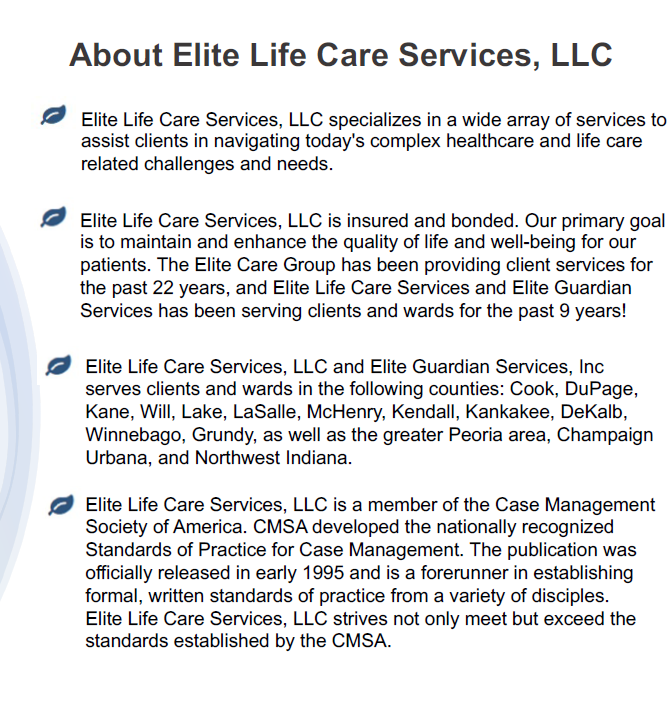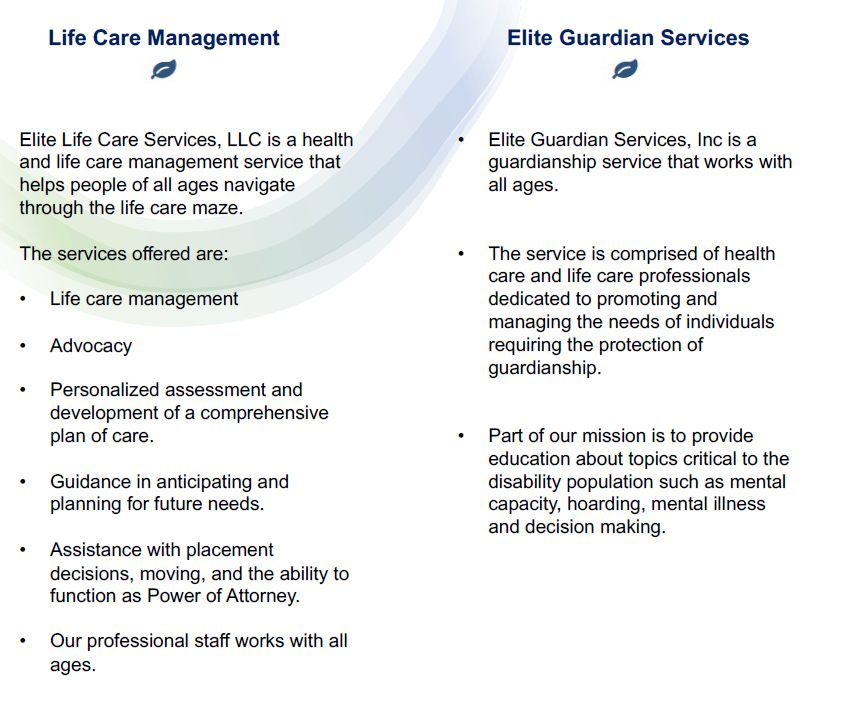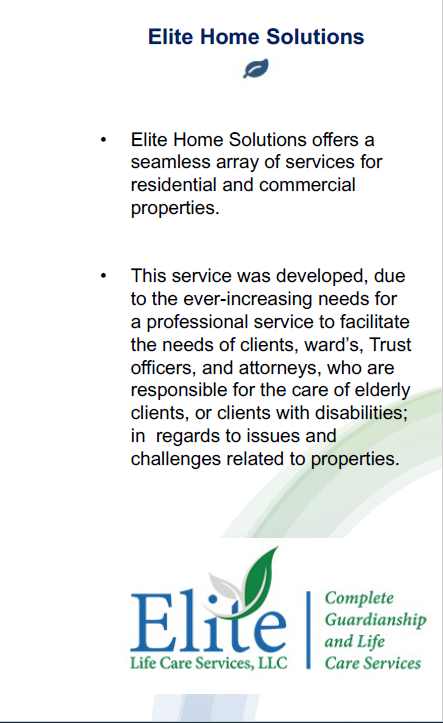Elite Life Care Services, LLC Newsletter – Winter 2022



“Winter, a lingering season, is a time to gather golden moments, embark upon a sentimental journey, and enjoy every idle hour.” –John Boswell
Holiday Greetings - what a year it has been! And what a year we are going to end on! A major winter storm, blizzard like wind and frigid temperature. I can't remember a holiday season like this in a long time!
Over the holidays, I challenge you to think of what your “hopes” are for the upcoming year and how you can make that hope come to fruition. Additionally, I encourage you to celebrate in a manner that protects your family’s and our community’s health and wellbeing, and I urge you to observe the holidays in a way that will benefit your mental health. Start by giving yourself grace. Along with great feelings of joy this year, there are also profound feelings of grief, and both are entirely valid given all we have been through this year. Give yourself room to feel and act, as you need. For example, set boundaries on negative influences; connect and share with close family or friends, and do not be afraid to ask for help. As always, Elite Life Care Services is here for you.
Here’s hoping everyone has a wonderful and healthy holiday season! See you in 2023!
Sincerely,
Troy Kerber
Executive Director
630-470-3893
Elite Life Care Services
Elite Guardian Services
www.elitelcs.com
A Day in the Life (or Evening) of a Care Manger! "The Elite Difference!"

Elite Life Care Services and Elite Guardian Services are available to their clients and wards, on a 24/7 basis! The “Elite difference” is a never ending constant, within an ever changing world, and universe! What is the “Elite difference” ? The Elite difference is a philosophy, not just another mission statement. This philosophy can take on several meanings, when applied, as, “ A Day in the Life , or Evening of an ELCS care manager!” The Elite Difference, entails the following,
ELCS treats every client and ward, as to how we would expect our own family members to be treated.
That difference includes a passion for the profession, compassion, empathy, creativity, and a professional approach to solving the clients health, and life challenges! As experts in this field, we are available 24/7.
Quite, often, the ELCS care manager starts their day, before the designated hours, of a normal 9am-5-pm business day, or after hours, beyond the 6pm threshold. Why is this? With the complexities of clients and wards needs, ranging from complex mental health cases to unexpected developments at home, for an elderly client, anything can happen, at anytime! Here are some real life scenarios!
1. The client/ward enters a manic state, as a result of a stressor, or unperceived trigger reaching out for help! These calls have no set timeline, and will continue, until they reach their lifeline, which is the ELCS care manager
2. The inability of a hired caregiver, or home health nurse to show up, at a scheduled shift, is always handled ,and solved by an ELCS care manager
3. The spontaneous, late ordered, and needed medications ,or essential groceries, that are needed, and solved by the ELCS Concierge
4. Night time is the right time! Many critical discussions, take place, after hours, with attorneys, who are passionate, and committed, as ELCS, in regards to a myriad of client/ward issues
Also, evening consultations, with family members can be the only time, that they are available to discuss the plan of care, for their loved ones!
5. The unanticipated property related situation occurs, such as loss of utilities, at a client/ward residence, water damage to the basement, or the caregiver and client are locked out of their residence. Ultimately solved, by the ELCS care manager
6. The unplanned, late discharge, of a client/ward, from the hospital. The client/ward has many needs to be addressed, in order to make this transition home a success! Aptly, solved by the ELCS care manager
7. The after hours call, in regards to a mental health client/ward, that has been arrested, for an alleged incident. Coordination of needed legal, and health services, and accurate reporting, that is essential for the overall well being, of the client/ward
8. The out of state family member, who requires consultation, and reporting exclusively after hours , in regards to the care pathway, of their loved one.
9.The essential, unplanned visitation, and wellness check, on behalf of a client/ward, at their respective skilled nursing facility to ensure, that the care plan, and quality of care is evident
10. The accessibility of the ELCS Executive Director 24/7 for notification, acceptance, and appointment, for an emergency guardianship, or emergency agent, for Power of Attorney situation.
11. Often, in our profession; since we are extremely passionate in our work, our most creative ideas originate, after hours, that we include in a care plan, to further benefit a client/ward during normal service hours.
12. During this pandemic, the ELCS care manager currently is looking, for updated information, from reliable sources, for those clients/wards, that are under quarantine. Often, those critical details are acquired, after hours.
13. The successful additions of our AMT programs that consist of art and music therapy, and WRAP programs that consist of wellness, recovery, action, plan, that continue to add quality and benefits to the lives of our clients and wards
As experts in our field, and as the “Guardian Angels” of our clients and wards; there are so many more unique scenarios, and situations, that arise, that haven’t been mentioned. At the end, of the day, or the beginning of the day; The Elite Difference philosophy continues to play a pivotal role in serving our clients and wards in Chicago, the western suburbs, the south suburbs, the northern suburbs, and northwest Indiana!
For any questions, regarding Elite Life Care Services, or Elite Guardian Services, please contact Troy Kerber, Executive Director, at 630-470-3893, or tkerber@elitelcs.com
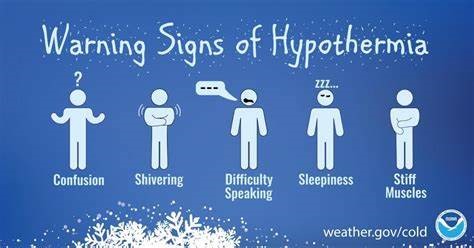
If you are like most people, you feel cold every now and then during the winter. What you may not know is that just being really cold can make you very sick. Older adults can lose body heat fast—faster than when they were young. Changes in your body that come with aging can make it harder for you to be aware of getting cold. A big chill can turn into a dangerous problem before an older person even knows what's happening. Doctors call this serious problem hypothermia.
What is Hypothermia?Hypothermia is what happens when your body temperature gets very low. For an older person, a body temperature of 95°F or lower can cause many health problems, such as a heart attack, kidney problems, liver damage, or worse. Being outside in the cold, or even being in a very cold house, can lead to hypothermia. Try to stay away from cold places, and pay attention to how cold it is where you are. You can take steps to lower your chance of getting hypothermia.
Living in a cold house, apartment, or other building can cause hypothermia. In fact, hypothermia can happen to someone in a nursing home or group facility if the rooms are not kept warm enough. If someone you know is in a group facility, pay attention to the inside temperature and to whether that person is dressed warmly enough. People who are sick may have special problems keeping warm. Do not let it get too cold inside and dress warmly. Even if you keep your temperature between 60°F and 65°F, your home or apartment may not be warm enough to keep you safe. This is a special problem if you live alone because there is no one else to feel the chilliness of the house or notice if you are having symptoms of hypothermia. Here are some tips for keeping warm while you're inside:
- Set your heat to at least 68–70°F. To save on heating bills, close off rooms you are not using. Close the vents and shut the doors in these rooms, and keep the basement door closed. Place a rolled towel in front of all doors to keep out drafts.
- Make sure your house isn't losing heat through windows. Keep your blinds and curtains closed. If you have gaps around the windows, try using weather stripping or caulk to keep the cold air out.
- Dress warmly on cold days even if you are staying in the house. Throw a blanket over your legs. Wear socks and slippers.
- When you go to sleep, wear long underwear under your pajamas, and use extra covers. Wear a cap or hat.
- Make sure you eat enough food to keep up your weight. If you don't eat well, you might have less fat under your skin. Body fat helps you to stay warm.
- Drink alcohol moderately, if at all. Alcoholic drinks can make you lose body heat.
- Ask family or friends to check on you during cold weather. If a power outage leaves you without heat, try to stay with a relative or friend.
A heavy wind can quickly lower your body temperature. Check the weather forecast for windy and cold days. On those days, try to stay inside or in a warm place. If you have to go out, wear warm clothes, and don't stay out in the cold and wind for a long time.
Here are some other tips:
- Dress for the weather if you have to go out on chilly, cold, or damp days.
- Wear loose layers of clothing. The air between the layers helps to keep you warm.
- Put on a hat and scarf. You lose a lot of body heat when your head and neck are uncovered.
- Wear a waterproof coat or jacket if it's snowy.
- Change your clothes right away if they get damp or wet.
For seniors living independently at home, as opposed to being cared for in a nursing or assisted living facility, it is important to make sure that the rooms of their private home are properly insulated against drafts and leaks. Older windows or roofing can easily let unwanted cool air inside, as well as significantly compromise energy efficiency. Investing in weather stripping, caulking, gutter cleaning, and structural inspections can help ensure that your loved one’s home is protected and safe to withstand harsh winter conditions.
With muscle weakness and compromised strength, older adults are always at a high risk of losing their balance and incurring a fall-related injury. Especially in icy and snowy conditions, it’s easy for anyone to slip and fall when outdoors in the winter, so extra caution is critical for older adults when walking on wet or icy sidewalks, and especially on stairs. Encourage your loved one to use handrails whenever possible or ask a friend, family member, or neighbor for extra support while walking outside. It is extremely dangerous for seniors with balance issues or osteoporosis to be out on wet or icy surfaces that compromise their steadiness. Strenuous activities like snow shoveling put too much strain on the heart, especially for seniors with chronic heart conditions. Establishing an outdoor maintenance plan that ensures prompt snow removal, salted ice, and cleared walkways is another proactive way to maintain senior safety in the winter.
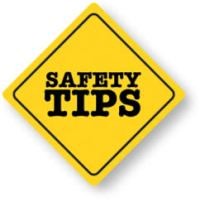
If your loved one is independent enough to drive on their own, keep in mind that winter driving can be hazardous for anyone, and especially poses higher risks for older drivers who may not drive as much as they used to or whose reflexes are not as quick as they once were. Be sure you get your loved one’s car professionally inspected and serviced before winter arrives. Changing tail lights, tires, brakes and wipers can make a big difference on winter roads and prevent dangerous accidents in inclement weather. Also make sure your loved one’s roadside assistance plan is up-to-date in case of emergencies and keep the car stocked with emergency essentials, such as batteries, snacks, flashlights, and blankets, just in case. Unless driving is absolutely necessary during severe winter conditions, it may be worthwhile to explore local options for reliable senior transportation services as a safer alternative.
A winter emergency plan is the best way to keep your loved one safe at home. If you are a caregiver and are unable to check on your loved one due to personal illness or emergency, have a trustworthy family member or friend on-call to step in when needed. Be sure to keep the house stocked with essentials such as non-perishable goods, flashlights, and warm blankets, in case a severe weather event occurs and leaves your loved one without electricity. Plan for someone to keep track of the supply of groceries and medications, as well as snow removal services in case a blizzard hits. By frequently checking in on an older adult, even if you can’t be there in person, and making a list of all emergency phone numbers, your loved one will be able to remain calm and know who to call for help if needed.
As you gear up for the season, it’s important to explore the ways in which wintertime can be memorable for everyone, even with being cautious and limiting time spent out of the house. Allow your older loved one to explore new hobbies and opportunities that wouldn’t otherwise be available — and don’t leave out the camera as you create memories in the process.
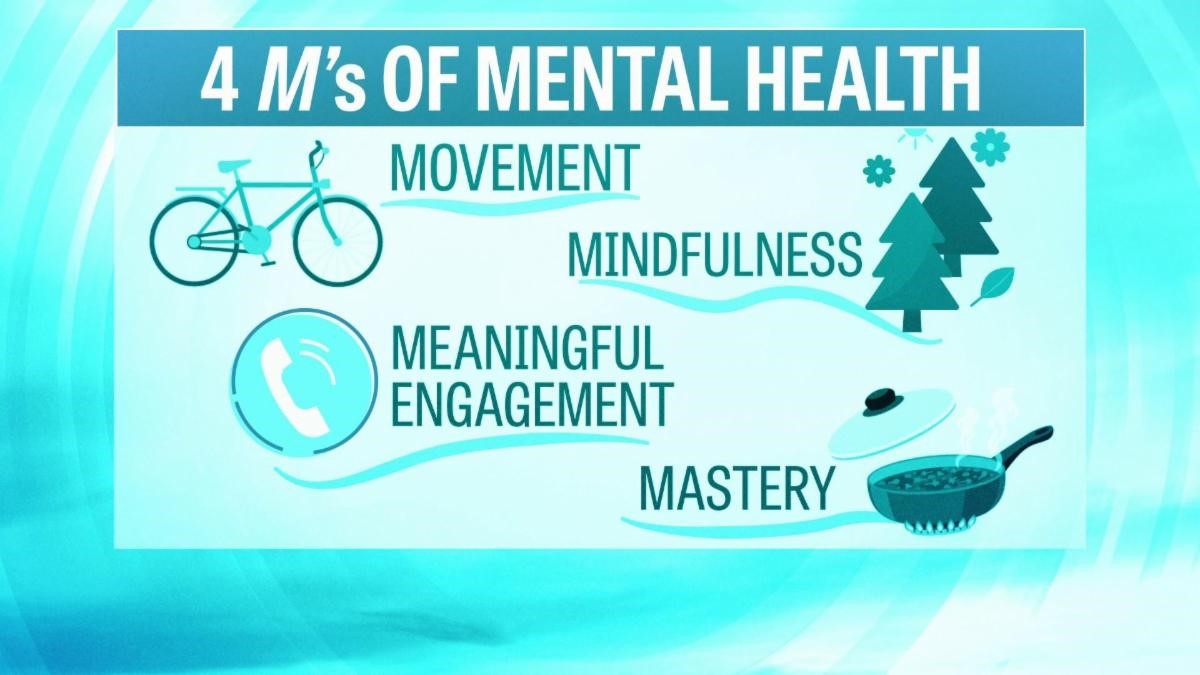
The winter months are a hard time for many people. With freezing temperatures, overcast skies, and lack of sun can lead to a decline in mental health. Older adults and seniors experience mental health a little differently. 20 percent of adults 55 and older experience some form of mental health issues. The more common form of mental health issues in seniors are cognitive impairment and dementia. But, the common mental health issues that a majority of people face from depression, anxiety, and mood disorders to anxiety tend to go undiagnosed in the elderly. Anxiety can morph itself into things like hoarding disorders, phobias, and Post Traumatic Stress Disorder (PTSD).
A big reason seniors are vulnerable to declining mental health is due to social isolation and sadness, as well as a decline in cognitive function. The good news is that there are several activities and resources seniors can take advantage of, so they don’t have to fall victim to their mental health. We’ll be giving you a variety of ways to help improve mental health in seniors.
Mind GamesWhile it’s important to maintain the body and keep it engaged and stimulated, it’s equally important to do the same with your brain! As we age, the brain needs a healthy amount of activity to keep it sharp and stimulated to avoid cognitive decline. So what kind of brain-boosting activities can you or a loved one do?
- Reading & Writing: The brain is a muscle if you don’t give it a workout its functions will decline. Reading books, magazines, newspapers, and online articles are great ways to give your brain a boost! Also, writing a journal can help you manage the effects of anxiety.
- Word puzzles challenge the brain, help improve concentration and increase vocabulary. Above all else, they help with memory and can improve mental functions in patients with brain damage or early dementia.
Growing old can become isolating, your children may be grown and have families of their own, friends and significant others may start to pass away, leaving you alone. Staying connected with your peers and friends will help to stave off loneliness and feelings of isolation. Additionally, finding activities/hobbies that make you happy will keep not just your brain active and healthy but also your body. If movement is hard you, and getting out the door and socializing with friends isn’t easy/accessible, have a friend teach you how to use Skype, Facetime and social media to connect with old friends and stay-in-touch with family.
Physical ActivityPhysical activity is good for the brain, body, and soul. From walks around town to daily stretch routines, to group physical activity. Daily physical activity helps to boost confidence, balance and is a great way to fight off the winter blues, reduce anxiety, and manage stress. By going on walks with a friend, family member or caretaker you’re staying fit and social. If your mobility is limited, there are plenty of low-impact workouts you can do from a chair that’ll reduce joint pain, chronic illness, and strengthens the muscles.
VolunteeringAfter retirement older adults and seniors might find themselves with too much time on their hands, a lack of fulfillment or looking for a sense of purpose. Volunteering gives older adults and seniors an outlet for using their skills, also a great way to stay involved in their community. Luckily, many organizations in everyone’s town are looking for volunteers of all ages and abilities. Whether you enjoy reading to kids, helping with a community garden, feeding the unhoused, or volunteering at the hospital, you’re remaining active, socially engaged, and gain a sense of belonging.
With winter blues to seasonal depression, fighting anxiety and depression is not always an easy battle, but the tactics mentioned above are great ways to boost your energy, self-worth, mood and curve the symptoms of depression.
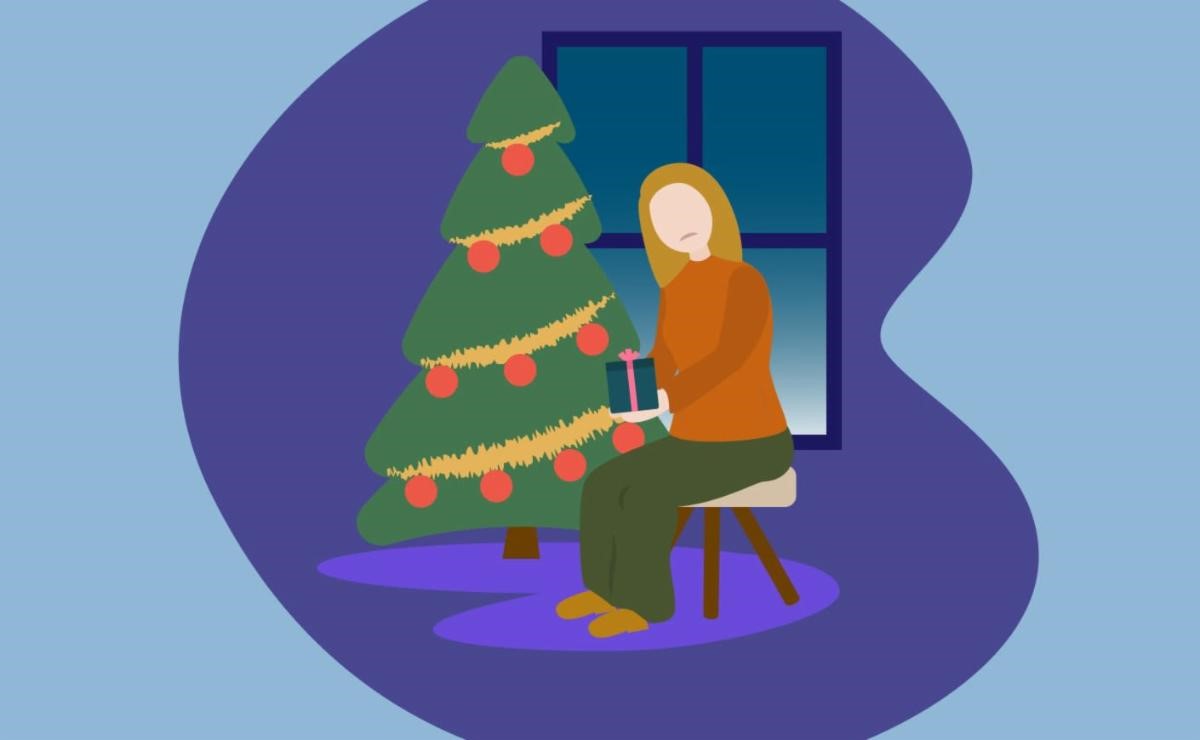
You might be alone on Christmas for different reasons, such as the death of a loved one, living far from relatives, or because of social isolation. If you have social anxiety disorder (SAD) and don't have close relationships with family or friends, loneliness at Christmas could be particularly hard.
In general, there are three ways to cope with being alone at Christmas. First, you can address your mental state and how it is contributing to your loneliness. Second, you can find things to do at Christmas that make you feel less alone. And third, you can plan ahead so that you are not alone this time next year if you don't want to be.
Christmas is the perfect day to take the time to appreciate what you have in life, be it good health, a place to live, or food on the table. Having gratitude will also help you to move past anxiety, as you learn to live in the present moment and be mindful of your surroundings. One way to practice gratitude is to write down three things you are grateful for on this day.
What if you're plagued by negative thoughts? If you feel like you don't know how to cope with being alone, ask yourself, "What would I do if I did know how to cope?" You have more power over your thoughts and how they make you feel than you think.
You can choose to feel lonely because you are alone, or you can choose to feel grateful for the positive things in your life. Reframing your negative thoughts is the basis of cognitive behavioral therapy (CBT), an effective treatment for social anxiety disorder. 1
Tips for Coping With Loneliness at Christmas
One way to cope with being alone on Christmas is to actually go out and do something productive. Rather than spend the day at home alone, find something that you can do that fits with your mindset and mental state for the day.
For example, if you feel full of energy, and the weather is decent, go for a long run. If you feel social, consider attending a church service to be in the presence of others. Below are some other ideas to keep you from focusing on the fact that you are alone this holiday.
Say 'Yes'
Perhaps you are alone this year because you turned down invitations. Know that it's OK to call those people back and say "yes." This is often a problem for those with social anxiety—you turn down invitations only to regret it and feel lonely afterward.
Take Time to Volunteer
One way to gain a better appreciation for the good things in your life is to get involved in volunteering. During the holidays, volunteering is a way to connect with others, boost your self-esteem, and bring joy to people who are less fortunate. Consider offering to help serve dinner at a soup kitchen, bring gifts to a children's hospital, or visit lonely residents at a nursing home. 2
You might even consider doing a grocery run for a neighbor, relative, or friend who can't leave the house. If you're helping someone who is sick or has a weakened immune system, remember to take precautions to protect them and yourself. This may include wearing a face covering and practicing physical distancing. If you feel nervous about doing these social activities, all the better; it's a chance to test your boundaries and expand your social skills. In fact, research shows that practicing kindness may reduce your tendency to avoid social situations. 3
Host an Orphan Christmas
Plan an "orphan Christmas" for those who have no one to spend the holiday with, or join a group of people in similar circumstances. If you feel anxious about reaching out, consider that other people who are alone on Christmas may feel isolated, lonely, and nervous to call on you, too.
Get to Work
If you enjoy your work, and you have the option to work on Christmas, spend the day being productive. This is a smart choice if your job involves interacting with co-workers or customers; being at work may help you to feel less lonely. If you don't have the option to work on Christmas, spend the day working around your home or on a project that you've put off for too long.
Enjoy Solitude
If being alone on Christmas is unavoidable, plan a day for yourself. Buy something online to treat yourself, cook your favorite foods, or plan a movie marathon. Or do something offbeat like learning a new language or starting work on the novel that's always been in your head. Christmas is a day to indulge in whatever makes you happy.
If You're Having Difficulty Coping
If you are feeling really down about being alone on Christmas and can't pull yourself out of it, reach out for help. Call a friend, family member, or a helpline. Regardless of whether you are physically separated from people on Christmas, you should never feel like you are lacking support. There are people who would love to hear from you and trained volunteers waiting to support and counsel you.
If you or a loved one are struggling with social anxiety disorder, contact the Substance Abuse and Mental Health Services Administration (SAMHSA) National Helpline at 1-800-662-4357 for information on support and treatment facilities in your area.
For more mental health resources, see our National Helpline Database.
